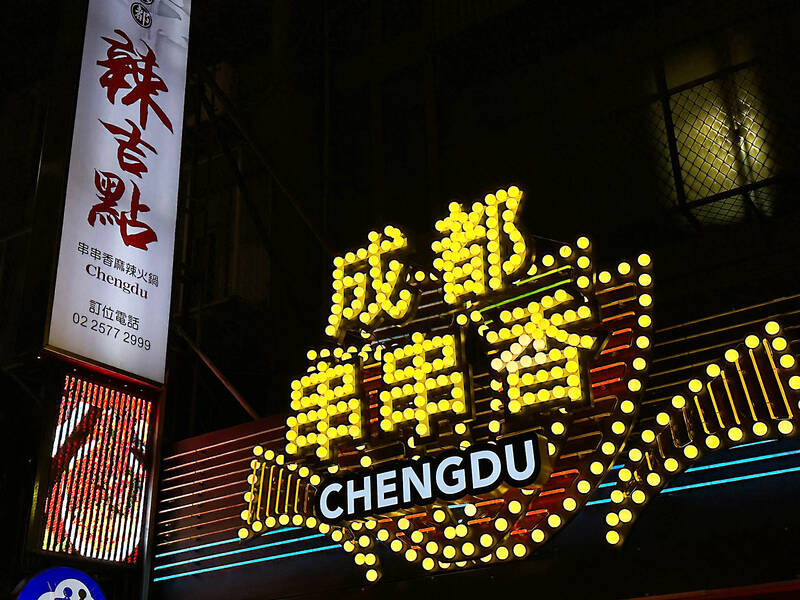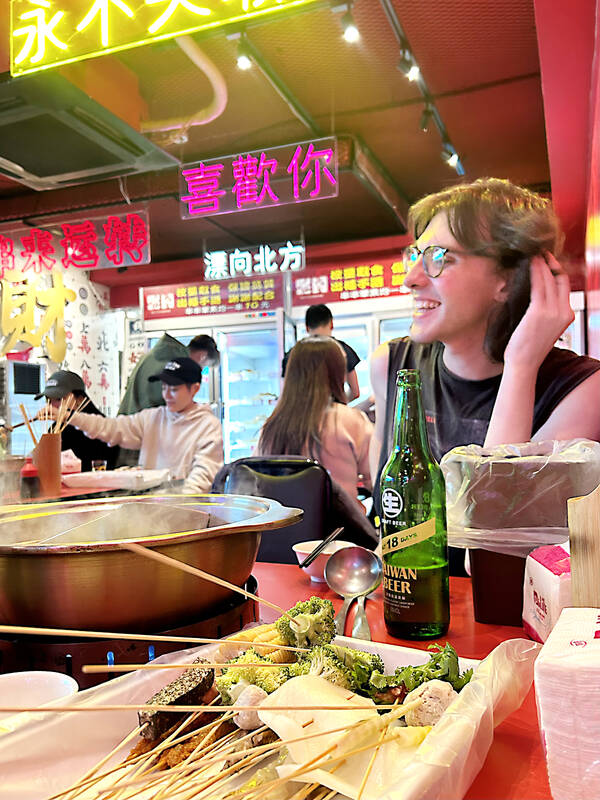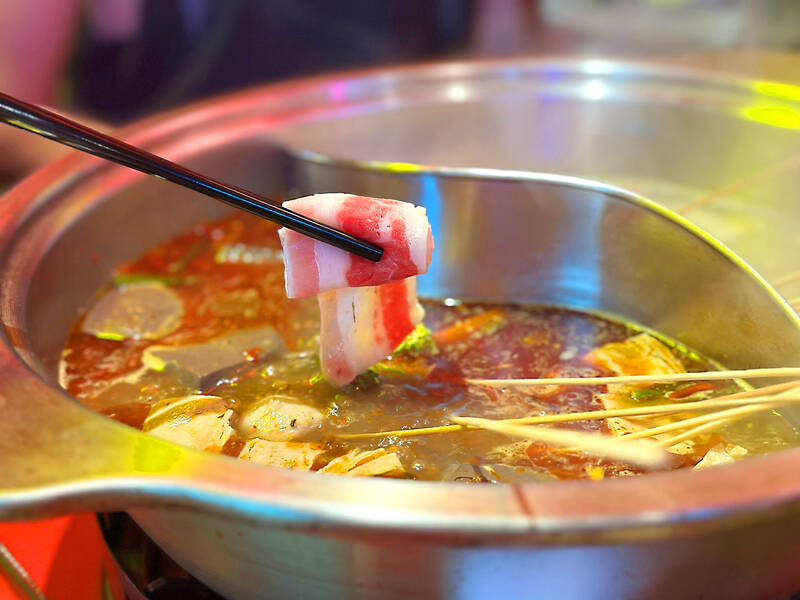Saturday night lights beckon us to the Instagram-lovers paradise that’s been blowing up our for-you pages recently with its neon signs, mahjong tiled walls and red-hot spicy hot pots.
Spicy Lucky Spot (辣吉點正宗成都串串香) in Songshan District (松山) is arguably the most Instagrammed hot pot experience in Taipei — but is it all photo props and vibey shots, or does it earn its mettle as the self-proclaimed “most authentic Chengdu hotpot experience?”
Armed with a mixed group representing the full spectrum from fussy eater to chili masochist, we push the customization of a shared hot pot to its outer limits. There were tears shedding, noses running and beers flowing, all components of the quintessential Sichuan dining experience.

Photo: Hollie Younger
This place is indeed a social media wonderland. From the outside, “Chengdu” flashes in spotlights more reminiscent of a casino or vintage Hollywood cinema, while inside neon lights hang from the ceiling, their cheesy characters exclaiming “I like you,” “a love that will never die” in retro fuchsia and cyan. The crowd is young, fun and like us, lining stomachs for a night on the town, albeit with clothes that will inevitably smell of boiled meat.
This spot’s unique draw is skewers offered at just NT$10 each — just grab your own from the fridges lining the back wall. An absolute bargain, I think, until I look despondently at a singularly skewered bamboo shoot smaller than my pinky finger. One broccoli floret? Really?
But it does heat up from here. The individual prawns are small yet refreshingly light, the squeaky pork meatballs are fantastic with a coating of spicy mala broth and the pigs blood cake is particularly good. The beef strip wrapped in a bushel of cilantro is the best offering for coriander contrarians like myself.

Photo: Hollie Younger
The skewer system certainly leads to a less intimidating ordering experience and offers a chance to make adventurous choices; for anyone up for a bitesize piece of duck heart or a taster of tripe.
Spicy Lucky Spot also offers a menu of set plates in gigantic portions — we opt for the classics, cabbage (NT$80), youtiao (油條, fried dough sticks) (NT$60) and enoki mushrooms (NT$80), paired with soft slithers of Matsusaka pork (NT$300), New Zealand beef sirloin (NT$320), a leaner cut, and best until last, US boneless Angus steak slices with their wonderfully marbled strips fat (NT$450).
We opt for the recommended mala and pork broth for three to four people (NT$480), arriving as a “half and half” yin-yang pot balancing harmoniously between a mild clear white broth on one side and a devilishly red Sichuan pepper soup with a strong right hook on the other.

Photo: Hollie Younger
We begin with weila (微辣), the lowest spice rating. Although the entire table is happy, this doesn’t even offer a tingle let alone a numbing sensation.
We ask our server to add a little more spice, who pours in an enormous amount of peppercorns and chilis. We watch in abject horror.
We’ve skipped the next spice level and blasted straight through to medium spicy or zhongla (中辣). This is how we know this place is authentic; by Taiwanese standards, a true Chengdu medium is a death sentence.
Even our strongest soldier wipes away their tears, as bottles of Taiwan Beer 18 Days (NT$120) are guzzled. The broth is equally balanced with chili and numbing heat, with the strips of marbled beef the perfect accompaniment to soak it all up, dipped into our hand-crafted sauce bowls of vinegar, soy sauce and traditional Chengdu sesame oil, which coats the mouth and offers a barrier to angry tastebuds against the roaring heat.
Spicy Lucky Spot now has eight branches across Taipei, but head to the Civic Boulevard (市民點) location for the best vibes and decor.
Sure, you’ll smell like boiled meat, and yes, the spice might break you — but with our bill coming in at just NT$650 a head, it’s a price worth paying for an evening of fiery flavor, flowing beers and Instagram-worthy vibes.

This month the government ordered a one-year block of Xiaohongshu (小紅書) or Rednote, a Chinese social media platform with more than 3 million users in Taiwan. The government pointed to widespread fraud activity on the platform, along with cybersecurity failures. Officials said that they had reached out to the company and asked it to change. However, they received no response. The pro-China parties, the Chinese Nationalist Party (KMT) and Taiwan People’s Party (TPP), immediately swung into action, denouncing the ban as an attack on free speech. This “free speech” claim was then echoed by the People’s Republic of China (PRC),

Exceptions to the rule are sometimes revealing. For a brief few years, there was an emerging ideological split between the Democratic Progressive Party (DPP) and Chinese Nationalist Party (KMT) that appeared to be pushing the DPP in a direction that would be considered more liberal, and the KMT more conservative. In the previous column, “The KMT-DPP’s bureaucrat-led developmental state” (Dec. 11, page 12), we examined how Taiwan’s democratic system developed, and how both the two main parties largely accepted a similar consensus on how Taiwan should be run domestically and did not split along the left-right lines more familiar in

Specialty sandwiches loaded with the contents of an entire charcuterie board, overflowing with sauces, creams and all manner of creative add-ons, is perhaps one of the biggest global food trends of this year. From London to New York, lines form down the block for mortadella, burrata, pistachio and more stuffed between slices of fresh sourdough, rye or focaccia. To try the trend in Taipei, Munchies Mafia is for sure the spot — could this be the best sandwich in town? Carlos from Spain and Sergio from Mexico opened this spot just seven months ago. The two met working in the

Many people in Taiwan first learned about universal basic income (UBI) — the idea that the government should provide regular, no-strings-attached payments to each citizen — in 2019. While seeking the Democratic nomination for the 2020 US presidential election, Andrew Yang, a politician of Taiwanese descent, said that, if elected, he’d institute a UBI of US$1,000 per month to “get the economic boot off of people’s throats, allowing them to lift their heads up, breathe, and get excited for the future.” His campaign petered out, but the concept of UBI hasn’t gone away. Throughout the industrialized world, there are fears that